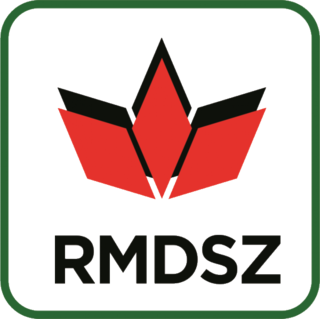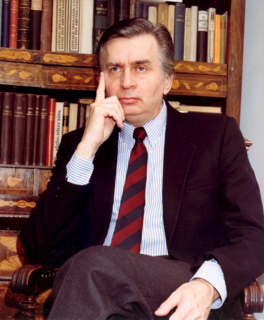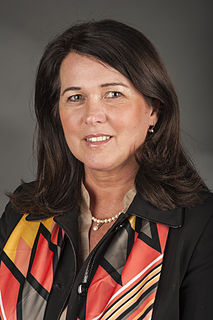
The Hungarian Socialist Party, known mostly by its acronym MSZP, is a social-democratic political party in Hungary.

Fidesz – Hungarian Civic Alliance is a national-conservative and right-wing populist political party in Hungary. It has dominated Hungarian politics on the national and local level since its landslide victory in the 2010 national elections on a joint list with the Christian Democratic People's Party, securing it a parliamentary supermajority that it retained in 2014 and again in 2018. Fidesz also enjoys majorities in the county legislatures, almost all urban counties and in the Budapest city council. Viktor Orbán has been the leader of the party for most of its history.

The Party of the Hungarian Community , formerly known as Party of the Hungarian Coalition, is a political party in Slovakia for the ethnic Hungarian minority. It was led by Pál Csáky, until the parliamentary election of 12 June 2010 where it failed to acquire 5% of the popular vote, the threshold necessary for entering the National Council of the Slovak Republic. Its votes went largely to Most-Hid, a new party led by former SMK leader Béla Bugár. In response, Csáky and the whole party leadership resigned.

The National Assembly is the parliament of Hungary. The unicameral body consists of 199 members elected to 4-year terms. Election of members is based on a complex system involving both area and list election; parties must win at least 5% of the popular vote in order to enter the list of members of the assembly. The Assembly includes 25 standing committees to debate and report on introduced bills and to supervise the activities of the ministers. The Constitutional Court of Hungary has the right to challenge legislation on the grounds of constitutionality. The assembly has met in the Hungarian Parliament Building in Budapest since 1902.
The European Parliament election of 2004 in Hungary was the election of MEP representing Hungary constituency for the 2004–2009 term of the European Parliament. It was part of the wider 2004 European election.

Viktor Mihály Orbán is a Hungarian politician serving as Prime Minister of Hungary since 2010. He also served as prime minister from 1998 to 2002. He is the present leader of the national conservative Fidesz party, a post he has held since 2003 and, previously, from 1993 to 2000.
The Alliance of Free Democrats – Hungarian Liberal Party was a liberal political party in Hungary.

The Democratic Alliance of Hungarians in Romania is a political party in Romania representing the Hungarian minority of Romania.

The Hungarian Workers' Party is a communist party in Hungary led by Gyula Thürmer. Established after the fall of the communist Hungarian People's Republic, the party has yet to win a seat in the Hungarian parliament. Until May 2009 it was a member of the Party of the European Left.
Elections in Hungary are held at two levels: general elections to elect the members of the National Assembly and local elections to elect local authorities. European Parliament elections are also held every 5 years.

The Christian Democratic People's Party is a Christian democratic political party in Hungary. It is officially a coalition partner of the ruling party, Fidesz, but is in reality a satellite party of Fidesz, and has been unable to get into the Parliament on its own since 2006. For several elections prior to the pact they had been unable to pass the election threshold of 5% of the vote. Without Fidesz, its support cannot be measured, and even a leading Fidesz politician, János Lázár, stated that Fidesz doesn't consider the government to be a coalition government.

The Alliance of Vojvodina Hungarians (Hungarian: Vajdasági Magyar Szövetség ; Serbian: Савез војвођанских Мађара / Savez vojvođanskih Mađara is an ethnic Hungarian political party representing the Hungarian minority in Serbia, primarily active in the province of Vojvodina. Its chairman is István Pásztor. Former party chairman József Kasza was an honorary president of the party until his title was revoked because of various disagreements on party issues.

The Movement for a Better Hungary, commonly known as Jobbik, is a Hungarian political party with radical and nationalist roots. At its beginnings the party described itself as "a principled, conservative and radically patriotic Christian party", whose "fundamental purpose" is the protection of "Hungarian values and interests." The party has been described as an "anti-Semitic organization" by The Independent and a "neo-Nazi party" by the president of the European Jewish Congress. Philosopher Ágnes Heller, a Holocaust survivor, says that Jobbik has never been a neo-Nazi party, although she described them as far-right and racist.

The 1990 Hungarian parliamentary elections were held in Hungary on 25 March 1990, with a second round of voting taking place in all but five single member constituencies on 8 April. They were the first completely free and competitive elections to be held in the country since 1945, and only the second free elections in the country's history. The conservative, nationalist Hungarian Democratic Forum (MDF) beat the liberal and more internationalist Alliance of Free Democrats, which had spearheaded opposition to Communist rule in 1989, to become the largest party in parliament. The Hungarian Socialist Party, the former Communist party, suffered a crushing defeat, winning only 33 seats for fourth place.

The European Parliament election of 2009 in Hungary was the election of the delegation from Hungary to the European Parliament in 2009. Hungary delegated 22 members to the European Parliament based on the Nice treaty and the election took place on 7 June.
The Government of Hungary exercises executive power in Hungary. It is led by the Prime Minister, and is composed of various ministers. It is the principal organ of public administration. The Prime Minister (miniszterelnök) is elected by the National Assembly and serves as the head of government and exercises executive power. The Prime Minister is the leader of the party with the most seats in parliament. The Prime Minister selects Cabinet ministers and has the exclusive right to dismiss them. Cabinet nominees must appear before consultative open hearings before one or more parliamentary committees, survive a vote in the National Assembly, and be formally approved by the President. The cabinet is responsible to the parliament.

Parliamentary elections were held in Hungary on 11 and 25 April 2010 to choose MPs for the National Assembly. They were the sixth free elections since the end of communist era. 386 members of parliament were elected in a combined system of party lists and electoral constituencies. The electoral law does not allow all adult citizens to stand for being elected unless they can validate 500 signatures of other citizens supporting their candidacy.

The European Parliament election, 2014 for the election of the delegation from Hungary to the European Parliament was held on 25 May 2014.

The 2014 Hungarian parliamentary election took place on 6 April 2014. This parliamentary election was the 7th since the 1990 first multi-party election. The result was a victory for the Fidesz–KDNP alliance, preserving its two-thirds majority, with Viktor Orbán remaining Prime Minister. It was the first election under the new Constitution of Hungary which came into force on 1 January 2012. The new electoral law also entered into force that day. For the first time since Hungary's transition to democracy, the election had a single round. The voters elected 199 MPs instead of the previous 386 lawmakers.

The 2018 Hungarian parliamentary election took place on 8 April 2018. This parliamentary election was the 8th since the 1990 first multi-party election and the 2nd since the adoption of a new Constitution of Hungary which came into force on 1 January 2012. The result was a victory for the Fidesz–KDNP alliance, preserving its two-thirds majority, with Viktor Orbán remaining Prime Minister. Orbán and Fidesz campaigned primarily on the issues of immigration and foreign meddling, and the election was seen as a victory for right-wing populism in Europe.


















